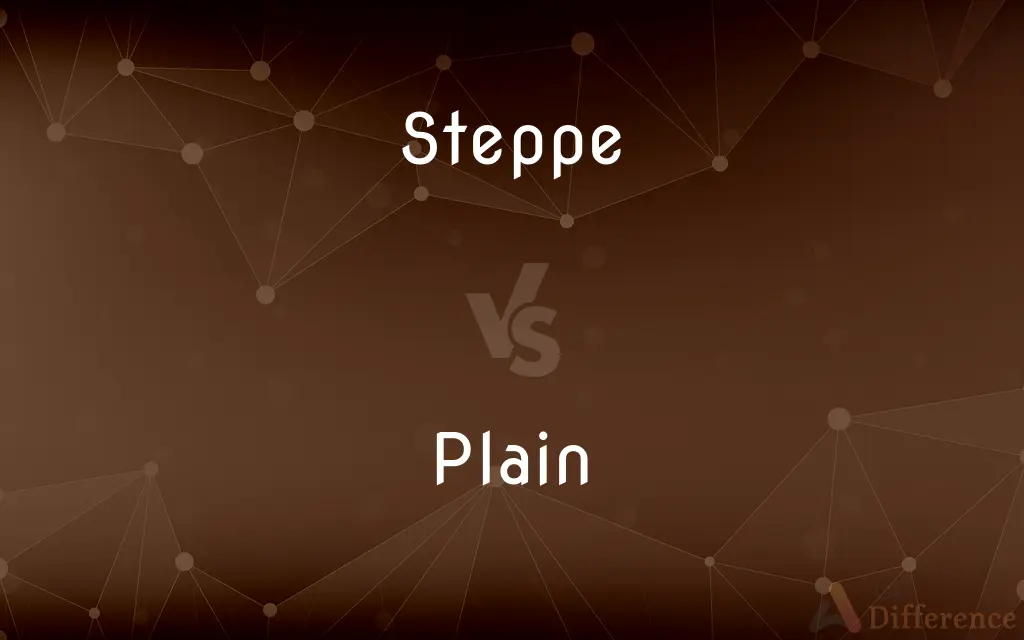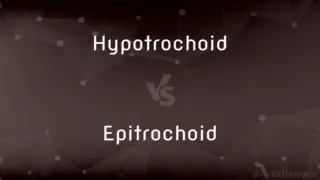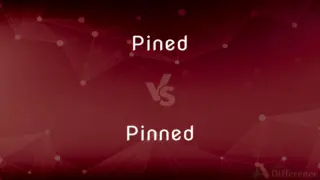Steppe vs. Plain — What's the Difference?
Edited by Tayyaba Rehman — By Urooj Arif — Updated on March 28, 2024
"Steppe" refers to vast, treeless plains in certain regions, known for dry climates and grasslands, e.g., the Eurasian steppe, while "plain" is a broad term for large, flat lands, which can vary in climate and vegetation.

Difference Between Steppe and Plain
Table of Contents
ADVERTISEMENT
Key Differences
Steppes are characterized by their extensive, treeless landscapes found primarily in semiarid regions. These areas support grasses and shrubs but lack significant tree growth due to the dry climate. Plains, on the other hand, are flat, extensive land areas that can occur in various climatic conditions and can support a wide range of vegetation, including forests, grasslands, and agricultural crops.
While steppes are often associated with specific geographic regions such as Central Asia, Eastern Europe, and parts of South America, the concept of plains is more general and can be found worldwide. Plains can include grasslands similar to steppes but also encompass areas with different types of vegetation. This distinction highlights the specific ecological and climatic conditions associated with steppes compared to the more varied environments of plains.
Steppes have a distinct ecosystem that has evolved under the conditions of low precipitation and high temperature variations between summer and winter, leading to a unique flora and fauna adapted to these conditions. Plains may also experience wide climatic variations, but their ecosystems are determined more by local conditions than by the overarching characteristics that define steppes.
Culturally and historically, steppes have played a significant role in the development of nomadic herding societies, influencing the lifestyle and economies of regions where they are found. Plains have also been crucial for human settlement and agriculture, given their generally fertile soils and conducive landscapes for farming and building.
The soil in steppes is typically fertile, especially in the black earth regions, supporting grasslands but often requiring irrigation for agriculture due to limited rainfall. In contrast, the soil quality of plains can vary widely, from fertile prairies to less productive flatlands, affecting their use for agriculture and habitation differently.
ADVERTISEMENT
Comparison Chart
Definition
Vast, treeless plains in semiarid regions
Large, flat lands, varying in climate and vegetation
Climate
Semiarid, with significant temperature variations
Varies widely, from arid to humid
Vegetation
Primarily grasses and shrubs, few trees
Can range from grasslands to forests and agricultural land
Geographic Location
Often found in Central Asia, Eastern Europe, South America
Found worldwide
Soil
Fertile but often requires irrigation for agriculture
Varies widely, from very fertile to less productive
Cultural Impact
Influenced nomadic herding societies
Supported various forms of settlement and agriculture
Ecosystem
Unique flora and fauna adapted to dry conditions
Diverse, depending on local climatic conditions
Compare with Definitions
Steppe
Characterized by its dry climate.
The steppe's dry climate shapes its ecosystem.
Plain
Often has fertile soil.
The fertile plains are ideal for extensive agriculture.
Steppe
Influences the culture of its inhabitants.
Steppe cultures have historically been centered around nomadic herding.
Plain
A broad area of flat land.
The Great Plains of the United States are an extensive area of flatland.
Steppe
A large area of flat, unforested grassland in southeastern Europe or Siberia.
The Mongolian steppe is home to traditional nomadic herding.
Plain
Can be found in various climates.
Plains exist in both arid and humid climates around the world.
Steppe
Has fertile soil called black earth.
The steppe regions are known for their black earth, conducive to certain types of agriculture.
Plain
Is significant for human settlement and development.
Historically, plains have supported large agricultural societies.
Steppe
Known for its specific type of vegetation.
Grasses dominate the steppe landscape.
Plain
Supports a wide range of vegetation.
The plains can be covered with forests, grasslands, or agricultural crops.
Steppe
In physical geography, a steppe is an ecoregion characterized by grassland plains without trees apart from those near rivers and lakes. Steppe biomes may include: the montane grasslands and shrublands biome the temperate grasslands, savannas and shrublands biomeThe prairie of North America (especially the shortgrass and mixed prairie) is an example of a steppe, though it is not usually called such.
Plain
In geography, a plain is a flat expanse of land that generally does not change much in elevation, and are primarily treeless. Plains occur as lowlands along valleys or at the base of mountains, as coastal plains, and as plateaus or uplands.In a valley, a plain is enclosed on two sides, but in other cases a plain may be delineated by a complete or partial ring of hills, by mountains, or by cliffs.
Steppe
A large area of flat unforested grassland in south-eastern Europe or Siberia.
Plain
Not decorated or elaborate; simple or basic in character
Everyone dined at a plain wooden table
Good plain food
Steppe
A vast semiarid grass-covered plain, as found in southeast Europe, Siberia, and central North America.
Plain
Having no pretensions; not remarkable or special
A plain, honest man with no nonsense about him
Steppe
The grasslands of Eastern Europe and Asia. Similar to (North American) prairie and (African) savanna.
Plain
Easy to perceive or understand; clear
The advantages were plain to see
It was plain that something was wrong
Steppe
A vast, cold, dry grass-plain.
Plain
(of a person) not beautiful or attractive
A plain, round-faced woman
Steppe
One of the vast plains in Southeastern Europe and in Asia, generally elevated, and free from wood, analogous to many of the prairies in Western North America. See Savanna.
Plain
Sheer; simple (used for emphasis)
The main problem is just plain exhaustion
Steppe
Extensive plain without trees (associated with eastern Russia and Siberia)
Plain
Denoting or relating to a type of knitting stitch produced by putting the needle through the front of each stitch from left to right.
Plain
Used for emphasis
Perhaps the youth was just plain stupid
Plain
Clearly or unequivocally
I'm finished with you, I'll tell you plain
Plain
A large area of flat land with few trees
The coastal plain
Plain
Mourn or lament.
Plain
Free from obstructions; open; clear
In plain view.
Plain
Obvious to the perception or mind; evident
Make one's intention plain.
Plain
Not elaborate or complicated; simple
Plain food.
Plain
Marked by little or no ornamentation or decoration
Plain garb.
Plain
Straightforward; frank or candid
Plain talk.
Plain
Not pretentious; unaffected.
Plain
Lacking beauty or distinction
A plain face.
Plain
Not mixed with other substances; pure
Plain water.
Plain
Common in rank or station; average; ordinary
A plain man.
Plain
Not dyed, twilled, or patterned
A plain fabric.
Plain
Sheer; utter; unqualified
Plain stupidity.
Plain
(Archaic) Having no visible elevation or depression; flat; level.
Plain
Often plains An extensive, level, usually treeless area of land.
Plain
A broad level expanse, as a part of the sea floor or a lunar mare.
Plain
Something free of ornamentation or extraneous matter.
Plain
Clearly; simply
Plain stubborn.
Plain
Flat, level.
Plain
Simple, unaltered.
Plain
Ordinary; lacking adornment or ornamentation; unembellished.
He was dressed simply in plain black clothes.
A plain tune
Plain
Of just one colour; lacking a pattern.
A plain pink polycotton skirt
Plain
Simple in habits or qualities; unsophisticated, not exceptional, ordinary.
They're just plain people like you or me.
Plain
(of food) Having only few ingredients, or no additional ingredients or seasonings; not elaborate, without toppings or extras.
Would you like a poppy bagel or a plain bagel?
Plain
(computing) Containing no extended or nonprinting characters (especially in plain text).
Plain
Obvious.
Plain
Evident to one's senses or reason; manifest, clear, unmistakable.
Plain
Downright; total, unmistakable (as intensifier).
His answer was just plain nonsense.
Plain
Open.
Plain
Honest and without deception; candid, open; blunt.
Let me be plain with you: I don't like her.
Plain
Clear; unencumbered; equal; fair.
Plain
Not unusually beautiful; unattractive.
Throughout high school she worried that she had a rather plain face.
Plain
(card games) Not a trump.
Plain
(obsolete) Full, complete in number or extent.
Plain
(colloquial) Simply.
It was just plain stupid.
I plain forgot.
Plain
(archaic) Plainly; distinctly.
Tell me plain: do you love me or no?
Plain
A lamentation.
Plain
An expanse of land with relatively low relief, usually exclusive of forests, deserts, and wastelands.
Plain
(archaic) field in reference to a battlefield.
Plain
(obsolete) plane: a flat geometric field.
Plain
To complain.
Plain
To lament, bewail.
To plain a loss
Plain
To level; to raze; to make plain or even on the surface.
Plain
To make plain or manifest; to explain.
Plain
To lament; to bewail; to complain.
We with piteous heart unto you pleyne.
Plain
To lament; to mourn over; as, to plain a loss.
Plain
To plane or level; to make plain or even on the surface.
We would rake Europe rather, plain the East.
Plain
To make plain or manifest; to explain.
What's dumb in show, I'll plain in speech.
Plain
Without elevations or depressions; flat; level; smooth; even. See Plane.
The crooked shall be made straight, and the rough places plain.
Plain
Open; clear; unencumbered; equal; fair.
Our troops beat an army in plain fight.
Plain
Not intricate or difficult; evident; manifest; obvious; clear; unmistakable.
Plain
Void of extraneous beauty or ornament; without conspicious embellishment; not rich; simple.
Plain
In a plain manner; plainly.
Plain
Level land; usually, an open field or a broad stretch of land with an even surface, or a surface little varied by inequalities; as, the plain of Jordan; the American plains, or prairies.
Descending fro the mountain into playn.
Him the AmmoniteWorshiped in Rabba and her watery plain.
Plain
A field of battle.
Lead forth my soldiers to the plain.
Plain
Extensive tract of level open land;
They emerged from the woods onto a vast open plain
He longed for the fields of his youth
Plain
A basic knitting stitch
Plain
Express complaints, discontent, displeasure, or unhappiness;
My mother complains all day
She has a lot to kick about
Plain
Clearly apparent or obvious to the mind or senses;
The effects of the drought are apparent to anyone who sees the parched fields
Evident hostility
Manifest disapproval
Patent advantages
Made his meaning plain
It is plain that he is no reactionary
In plain view
Plain
Not elaborate or elaborated; simple;
Plain food
Stuck to the plain facts
A plain blue suit
A plain rectangular brick building
Plain
Lacking patterns especially in color
Plain
Not mixed with extraneous elements;
Plain water
Sheer wine
Not an unmixed blessing
Plain
Free from any effort to soften to disguise;
The plain and unvarnished truth
The unvarnished candor of old people and children
Plain
Lacking embellishment or ornamentation;
A plain hair style
Unembellished white walls
Functional architecture featuring stark unornamented concrete
Plain
Lacking stylistic embellishment;
A literal description
Wrote good but plain prose
A plain unadorned account of the coronation
A forthright unembellished style
Plain
Comprehensible to the general public;
Written for the popular press in plain nontechnical language
Plain
Lacking in physical beauty or proportion;
A homely child
Several of the buildings were downright homely
A plain girl with a freckled face
Plain
Unmistakably (`plain' is often used informally for `plainly');
The answer is obviously wrong
She was in bed and evidently in great pain
He was manifestly too important to leave off the guest list
It is all patently nonsense
She has apparently been living here for some time
I thought he owned the property, but apparently not
You are plainly wrong
He is plain stubborn
Common Curiosities
What defines a steppe?
A steppe is defined as a large, flat, treeless grassland, typically found in semiarid regions.
What kind of climate is associated with steppes?
Steppes are associated with semiarid climates, characterized by low precipitation and significant temperature variations.
How do plains affect agriculture?
Plains, with their generally fertile soils and flat lands, are ideal for agriculture and have supported large agricultural developments and settlements.
How are plains different from steppes?
Plains are broad, flat lands that can vary in climate and vegetation, unlike steppes, which are specifically treeless and found in semiarid areas.
Can a plain be a steppe?
Yes, if a plain is located in a semiarid region and supports grassland vegetation without significant tree cover, it can be classified as a steppe.
What vegetation is found on steppes?
Steppes primarily support grasses and shrubs, with few trees due to the dry climate.
What is the significance of steppes in history?
Steppes have historically supported nomadic herding cultures and influenced the economies and lifestyles of regions where they are found.
Are all plains flat?
Yes, the defining characteristic of plains is their extensive, flat lands, although they can vary in elevation.
Can plains support forests?
Yes, depending on the climate and soil, plains can support forests, grasslands, or agricultural crops.
Why are steppes treeless?
Steppes are treeless mainly due to their semiarid climate, which does not support significant tree growth.
Share Your Discovery

Previous Comparison
Hypotrochoid vs. Epitrochoid
Next Comparison
Pined vs. PinnedAuthor Spotlight
Written by
Urooj ArifUrooj is a skilled content writer at Ask Difference, known for her exceptional ability to simplify complex topics into engaging and informative content. With a passion for research and a flair for clear, concise writing, she consistently delivers articles that resonate with our diverse audience.
Edited by
Tayyaba RehmanTayyaba Rehman is a distinguished writer, currently serving as a primary contributor to askdifference.com. As a researcher in semantics and etymology, Tayyaba's passion for the complexity of languages and their distinctions has found a perfect home on the platform. Tayyaba delves into the intricacies of language, distinguishing between commonly confused words and phrases, thereby providing clarity for readers worldwide.














































